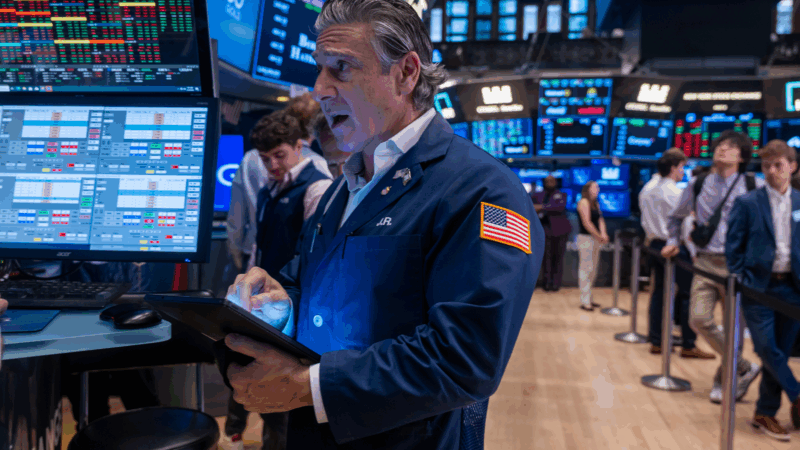Stocks hit a new record high after markets open for trading
The S&P 500 index — which represents the largest and best known companies in the stock market — hit a new record high as soon as trading opened on Friday, reversing a spring slump tied to President Trump’s trade war.
Investors have also shrugged off recent fighting in the Middle East, to send the S&P 500 index towards a fresh peak, eclipsing the previous high reached back in February.
It’s a remarkable turnaround for stocks, given that the index had fallen into bear market territory less than three months ago.
In April, the index dropped 20% from its February high, after the president announced double-digit tariffs on nearly everything the U.S. imports. While some of the steepest tariffs have been temporarily suspended, import taxes are still the highest they’ve been in nearly a century.
Trump said Thursday that the U.S. has reached a trade agreement with China, although he offered no details.
The Dow Jones Industrial Average and the Nasdaq also gained ground Friday, with the Nasdaq on track to top its own previous record from December.
Recent attacks by the U.S. and Israel on nuclear sites in Iran initially pushed oil prices higher, which can be a drag on the economy. But oil prices dropped sharply this week as a tentative ceasefire went into effect.
Stocks have gotten a boost from strong corporate earnings and a resilient job market. But there are still potential clouds on the economic horizon.
Consumer spending, which is the economy’s biggest driver, has shown signs of weakness lately. Personal spending fell 0.1% in May, according to a report from the Commerce Department Friday. Consumer spending in the first three months of the year was softer than initially reported, leading to a downgrade of first-quarter GDP.
The Federal Reserve has also been cautious about cutting interest rates, out of concern that Trump’s tariffs could rekindle inflation in the months to come.
Consumer prices in May were up 2.3% from a year ago, according to the Commerce Department’s inflation yardstick, which is closely watched by the central bank. Fed policymakers voted unanimously to hold interest rates steady last week, although they signaled that rates could drop later this year.
Malinowski concedes to Mejia in Democratic House special primary in New Jersey
With the race still too close to call, former congressman Tom Malinowski conceded to challenger Analilia Mejia in a Democratic primary to replace the seat vacated by New Jersey Gov. Mikie Sherrill.
FBI release photos and video of potential suspect in Guthrie disappearance
An armed, masked subject was caught on Nancy Guthrie's front doorbell camera one the morning she disappeared.
Reporter’s notebook: A Dutch speedskater and a U.S. influencer walk into a bar …
NPR's Rachel Treisman took a pause from watching figure skaters break records to see speed skaters break records. Plus, the surreal experience of watching backflip artist Ilia Malinin.
In Beirut, Lebanon’s cats of war find peace on university campus
The American University of Beirut has long been a haven for cats abandoned in times if war or crisis, but in recent years the feline population has grown dramatically.
Judge rules 7-foot center Charles Bediako is no longer eligible to play for Alabama
Bediako was playing under a temporary restraining order that allowed the former NBA G League player to join Alabama in the middle of the season despite questions regarding his collegiate eligibility.
American Ben Ogden wins silver, breaking 50 year medal drought for U.S. men’s cross-country skiing
Ben Ogden of Vermont skied powerfully, finishing just behind Johannes Hoesflot Klaebo of Norway. It was the first Olympic medal for a U.S. men's cross-country skier since 1976.







